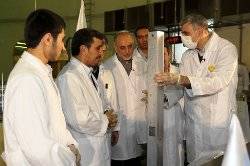The International Atomic Energy Agency has said that its team visiting Iran was denied access to a military site where the UN watchdog suspects activities related to the country's nuclear program could be taking place.
The head of the IAEA said on Wednesday that Iran had not accepted a request for its inspectors to visit the Parchin facility, a weapons development complex south of Tehran.
"It is disappointing that Iran did not accept our request to visit Parchin during the first or second meetings," said Yukiya Amano, the IAEA's director general. "We engaged in a constructive spirit, but no agreement was reached."
"Intensive efforts were made to reach agreement on a document facilitating the clarification of unresolved issues in connection with Iran's nuclear program," the IAEA said in a statement.
The visit, led by Herman Nackaerts, the Vienna-based agency's chief inspector, was the second in less than a month and was aimed, the IAEA said, at clarifying all "outstanding substantive issues" surrounding Tehran's nuclear program, in particular what it called "possible military dimensions."
Ali Asghar Soltanieh, Iran's envoy to the IAEA, was quoted by the Iranian news agency ISNA as saying the talks had been intensive and covered "cooperation and mutual understanding between Iran and the IAEA".
"These negotiations will continue in the future," Soltanieh said.
The trip was also seen as an important precursor to a possible resumption of talks between Iran and the P5+1 powers, the United States, China, Russia, France, Britain and Germany, which broke down in Turkey 13 months ago.
An IAEA report in November said that Iran had carried out activities in a number of areas "relevant to producing" a nuclear weapon. Iran denies it is seeking to develop nuclear weapons and said the report was based on forgeries.
Since its publication, the US and the European Union have stepped up sanctions on Iran's oil sector amid speculation that Israel could be preparing to launch a pre-emptive attack on Tehran's nuclear sites.
PHOTO CAPTION
Picture from the Iranian presidency shows President Mahmoud Ahmadinejad (2nd L) and Foreign Minister Ali AKbar Salehi (C) listening to an expert during a tour of Tehran's research reactor centre last week.
Al-Jazeera


 Home
Home Discover Islam
Discover Islam Quran Recitations
Quran Recitations Lectures
Lectures
 Fatwa
Fatwa Articles
Articles Fiqh
Fiqh E-Books
E-Books Boys & Girls
Boys & Girls  Articles
Articles










